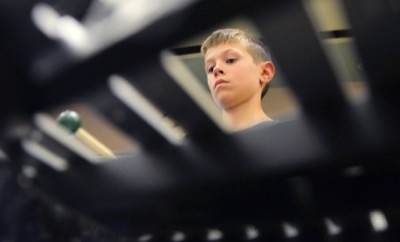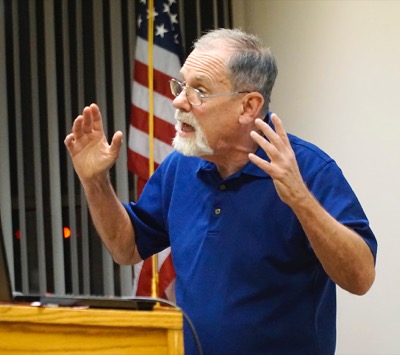Saturday, November 3rd, 2018
Music's benefits noteworthy
By Tom Stankard

Photo by Dan Melograna/The Daily Standard
Fifth-grader Austin Siefring plays the xylophone Thursday during a beginner percussion class at Celina Intermediate School.
Music has no age limit and targets all parts of the brain, developing skills used in every stage of life, music teachers and a therapist said.
Learning to read and play music in school helps students develop skills on both sides of the brain and teaches them valuable lessons other subjects can't, said Shawn Snider, Celina Intermediate School music teacher.
As an art form, music is centered on creativity, an element of the right side of the brain that not all subjects utilize, he said.
"Sometimes students get locked into rigorous structure that makes school not fun," he said. "So giving them a little bit of power through creativity will help them blossom and shine a little bit more."
More than just creativity, high school band director Chuck Sellars said music develops problem-solving and critical-thinking skills. These skills, he said, teach students to identify patterns, read music like they would a new language and fine-tune motor skills to play the chords.
Playing an instrument each day teaches the lesson of "practice makes perfect," Sellars noted.
District music director Katie Brautigam agreed, saying getting better at playing can build confidence.
"There's some kids who have never played an instrument before. It requires them to practice and play in front of someone who's watching," she said.
Performing music in a group setting can enhance teamwork skills as well, they noted.
"The part an individual plays makes no sense without the other parts around it," Sellars said. "Kids realize we can't create this without each other and have to learn how the parts interact with each other and how to respond to each other as people."
Some students struggle in their other classes but excel in music, they said. This is because listening to music "forces you to access your emotions," Sellars added.
"It releases endorphins, which makes you feel," he said. "It helps them deal with things in a way nothing else can. It's part of the human condition."
Sixth-grader Lexie Bruggeman said playing "gives me a chance to just let everything go and put it all into my music." Her classmate, sixth-grader Taryn Bowlby, said songs she plays "can make me feel excited or joyful, depending on what you're playing."
The therapeutic power of music continues beyond youth and reaches through life to the very end, according to a therapist. State of the Heart Care Music Therapist Ashlee Slavin said music can trigger emotions some people may not have felt in a long time. When she plays music for her hospice patients, she said it comforts them as their eyes open up and they begin to relax.
"It can be a comfort because it's such a natural part of life," she said.
Music can be a natural medicine, she added, because "it can do things other medicines can't."
Some of her patients suffer from dementia. Slavin said those patients "might not know my name, but they start singing along with me because they recognize the song."


